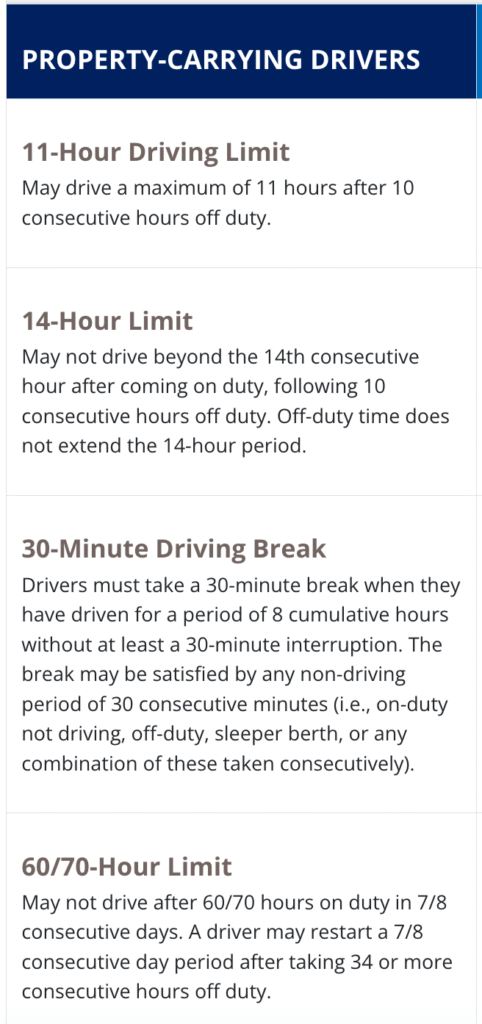Truck drivers are crucial in the transportation industry, delivering goods and products nationwide. However, with long hours on the road and strict regulations, many people wonder: how many hours can a truck driver drive in a day? Houston truck accident attorney Greg Baumgartner examines the regulations and guidelines governing truck driver hours and the importance of road safety.
THE REGULATIONS AND GUIDELINES
FEDERAL MOTOR CARRIER SAFETY ADMINISTRATION (FMCSA)
The Federal Motor Carrier Safety Administration (FMCSA) regulates and enforces safety standards for commercial motor vehicles, including trucks. They have established regulations and guidelines for truck driver hours to ensure the safety of both the driver and others on the road.
HOURS OF SERVICE (HOS) REGULATIONS
The Hours of Service (HOS) regulations limit the number of hours a truck driver can drive daily and weekly. These regulations are in place to help prevent driver fatigue, which can lead to road accidents.
According to the FMCSA, truck drivers can drive a maximum of 11 hours in 24 hours. This rule is known as the “14-hour rule,” which means that a driver can only be on duty for 14 consecutive hours, including driving time and breaks. After reaching the 14-hour limit, the driver must take a 10-hour break before starting their next shift.
WEEKLY LIMITS
In addition to daily limits, there are weekly limits for truck drivers. A driver can only work a maximum of 60 hours in 7 days or 70 hours in 8 days. This rule is known as the “60/70-hour rule.” After reaching the weekly limit, the driver must take a 34-hour break before starting their next shift.
EXCEPTIONS TO THE RULES
There are some exceptions to the HOS regulations for certain industries and situations. For example, drivers transporting livestock or agricultural products may be subject to different regulations due to the nature of their cargo. Additionally, drivers operating within a 100-mile radius and returning to their starting location within 12 hours are exempt from the 14-hour rule.
THE IMPORTANCE OF SAFETY ON THE ROAD
The regulations and guidelines for truck driver hours are in place for safety. Driving a large commercial vehicle for extended periods can be physically and mentally demanding, and drivers must take regular breaks and get sufficient rest to prevent accidents on the road.
According to the FMCSA, driver fatigue is a leading cause of truck accidents. A recent study by the National Highway Traffic Safety Administration found that 13% of commercial motor vehicle drivers were considered tired at the time of their crash.
Not only does fatigue affect the driver’s ability to operate the vehicle safely, but it can also impact their decision-making and reaction time. Fatigue can be especially dangerous when driving on busy highways or in hazardous weather conditions.
THE ROLE OF TECHNOLOGY IN MONITORING TRUCK DRIVER HOURS

With the advancement of technology, tools and systems are now in place to monitor and track truck driver hours. These tools not only help drivers stay within the regulations but also provide valuable data for companies to improve their operations and ensure the safety of their drivers.
ELECTRONIC LOGGING DEVICES (ELDS)
Electronic Logging Devices (ELDs) are electronic devices that record a driver’s hours of service. They are connected to the vehicle’s engine and automatically record driving time, breaks, and rest periods. ELDs are mandatory for all commercial motor vehicles and have replaced traditional paper logs.
ELDs make it easier for drivers to track their hours and provide accurate data for companies to monitor and improve their operations. This data can also be used to ensure that drivers are taking enough breaks and getting enough rest to prevent fatigue.
FLEET MANAGEMENT SYSTEMS
Fleet management systems are another technology that can help companies monitor and manage truck driver hours. These systems provide real-time data on the location, status, and performance of vehicles, as well as driver behavior.
With fleet management systems, companies can track the number of hours a driver has been on the road and when they need to take breaks. This technology can help prevent violations of HOS regulations and ensure the safety of their drivers.
THE IMPACT OF TRUCK DRIVER HOURS ON THE INDUSTRY
The regulations and guidelines for truck driver hours not only impact the safety of drivers and others on the road, but they also significantly impact the transportation industry as a whole.
DRIVER SHORTAGE
One of the main challenges facing the trucking industry is a shortage of drivers. With strict regulations and long hours on the road, many people hesitate to pursue a career as a truck driver. This shortage can lead to delays in deliveries and increased costs for companies.
INCREASED DEMAND FOR TECHNOLOGY IN TRUCKING
As mentioned earlier, technology is crucial in monitoring and managing truck driver hours. With the increasing demand for accurate data and efficient operations, there is a growing need for advanced technology in the transportation industry.
Companies are investing in fleet management systems, ELDs, and other tools to improve their operations and ensure the safety of their drivers. Technology advances also create opportunities for companies to develop new and innovative solutions for the industry.
FATIGUED DRIVING CAUSES MAY LEAD TO TRUCK WRECKS
Regulations and guidelines for truck driver hours are in place to ensure the safety of both drivers and other road users. With a maximum of 11 hours of driving in 24 hours and weekly limits of 60 or 70 hours, drivers must take breaks and get enough rest to prevent fatigue.
Fatigued driving is a major cause of truck accidents. The rules are trying to prevent more crashes.
Technology plays a crucial role in monitoring and managing truck driver hours, providing valuable data that enables companies to enhance their operations and ensure the safety of their drivers. As the transportation industry continues to evolve, it’s essential to prioritize safety and adhere to regulations to ensure the industry’s success and sustainability.
At Baumgartner Law Firm, we have found many instances of truck drivers cheating on their driving hours. The violations of the driving rules were only discovered after we filed a truck accident lawsuit and conducted an extensive investigation of the truck crash.
In other cases, we have proven the motor carrier was negligent in hiring or retaining drivers.
IF INVOLVED IN A COLLISION WITH AN 18-WHEELER OR BIG RIG, CALL BAUMGARTNER LAW FIRM FOR HELP!
Families have trusted our truck accident law firm in Houston for over 35 years to protect their rights after an accident with a big truck. Contact us at (281) 587-1111 for a free consultation.
6711 Cypress Creek Pkwy, Houston, TX, 77069
Visit Our Law Firm in Houston
RELATED TRUCK ACCIDENT RESOURCE
Why are Settlements Larger for Truck Crashes?
The Difference Between Car Accidents and Big Truck Wrecks
What is the Average Semi-Truck Settlement?
What are the Most Common Mechanical Failures for Big Rigs?
How Long Does it Take to Settle an 18-Wheeler Accident Case?
What are the Insurance Requirements For 18-Wheelers in Texas?
Houston Fatal Truck Accident Lawyer
Federal Regulation of Truck Drivers
Blind Spot Truck Accident Lawyer in Houston
The Most Common Injuries in Truck Accidents
DOT Summary of Driving Rules














